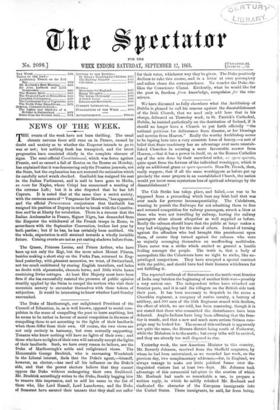The Duke of Marlborough, our enlightened President of the Council
of Education, is, as is well known, opposed to moral com- pulsion in the sense of compelling the poor to learn anything, but he seems to be rather in favour of moral compulsion in the sense of compelling them to act according to the lights of their landlords when these differ from their own. Of course, the two views are not only entirely in harmony, but even mutually supporting. Tenants who know nothing will have no lights of their own ; and those who have no lights of their own will naturally accept the lights of their landlords. Such, we have every reason to believe, are the Duke of Marlborough's noble and enlightened views. The Honourable George Brodrick, who is canvassing Woodstock in the Liberal interest, finds that the Duke's agent,—himself, however, an elector,—has used all his influence on the Duke's side, and that the poorer electors believe that they cannot oppose the Duke without endangering their own livelihood. Mr. Brodrick accordingly writes to the Duke, frankly begging him to remove this impression, and to add his name to the list of those who, like Lord Russell, Lord Lansdowne, and the Duke of Somerset have assured their tenants that they shall not suffer for their votes, whichever way they be given. The Duke positively declines to take this course, and in a letter at once peremptory and sullen closes the correspondence. No wonder the Duke dis- likes the Conscience Clause. Evidently, what he would like for the poor is, freedom from knowledge, compulsion for the con- science.






























